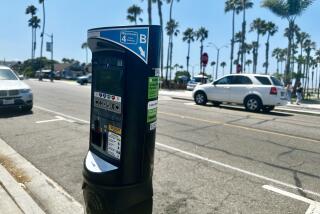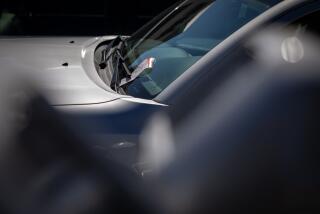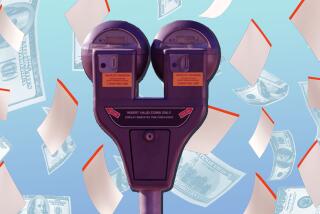Parking Meter Manufacturer Sees Bright Future for New Sun-Powered Devices
- Share via
RUSSELLVILLE, Ark. — Seth (Skeeter) Ward has devised what he calls a revolutionary parking meter that runs on sun power and can erase the time remaining when a vehicle pulls out of a parking space.
Its jam-resistant coin chute can tell a U.S. quarter from a Mexican peso, a Canadian quarter or a quarter-sized washer or slug. Customers may also pay with a plastic debit card.
Ward, 35, is president of P.O.M. Inc., one of the biggest parking meter manufacturers in the United States. P.O.M. stands for Park-O-Meter, the original name of the company’s first mechanical meter in 1935.
What happens to his new solar meter if the sun is not shining?
“We have storage capacity that will run this meter in pitch dark for 72 hours,” Ward said. “And we will probably improve on that.”
Ward said the meters would get plenty of power from available light on even the cloudiest day or in the shadiest area.
Prototypes have been tested for two years on top of a building in Little Rock, about 80 miles south of Russellville, where P.O.M. is headquartered.
The gizmo contains an electronic eye, like an auto-focus camera, that senses departing vehicles and returns its clock to zero, eliminating free time for the next vehicle. It also senses when new parkers arrive and can electronically alert meter police if they do not pay.
Ward said the meter costs about $240 if installed in an existing housing; the complete unit including a new housing costs about $340. A conventional meter costs about $180, but Ward said the money-saving features of his new units make them a good purchase for revenue-hungry cities.
About 500 were scheduled for shipment in last month to cities in 12 states and several overseas locations, including Shepparton, Australia, which bills itself as “the Solar City,” and Auckland, New Zealand. Officials installed some in early April in front of the Federal Building in Little Rock.
The meter also features a scrolling advertising message that runs across a digital display. The Australian meters, for instance, will scroll, “Welcome to Shepparton, the Solar City.”
Tom Sekely, general foreman for traffic in the Little Rock Department of Public Works, said the city is most interested in the meter’s inventory capabilities.
“We will be able to tell how much each meter is being used and would have the capability of moving meters around where they would be more beneficial,” Sekely said.
The potential ease of maintenance also was a selling factor, Sekely said.
“Electronics repair people are easier to get than watch repairmen,” said Sekely, who calls standard manual parking meters nothing more than “an eight-day clock.”
Ward gets excited when he talks about his new meter’s capabilities.
“I can tell a city that I can measure the efficiency of their ticket writers,” Ward said. “I can tell you, with an auditing system, how many people were illegally parked and didn’t get tickets.”
But P.O.M. is not getting out of the manual parking meter business, Ward said.
The company got 60% of all bids it knew of in the United States last year, and about 30% of its 1988 sales were in foreign markets, said P.O.M. sales administration manager Bobra Wilbanks.
When Ward bought P.O.M. about eight years ago, he discovered that cities were largely unwilling to mix different meters. To his dismay, the most popular meter was made by rival Duncan Parking Control Systems, located in Harrison, Ark.
P.O.M. had some big cities--Denver and San Francisco, for example--using its mechanical meters but was unable to penetrate markets such as New York, which has 63,000 meters.
When the patent on the Duncan meter ran out three years ago, Ward virtually copied it. Now, he sells replacement parts and new meters that will fit in his competitor’s housing.
New York officials bought 18,000 handles for mechanical meters on the last order, Wilbanks said. Vandalism and normal wear-and-tear are the most common causes of broken handles, she said.
More to Read
Inside the business of entertainment
The Wide Shot brings you news, analysis and insights on everything from streaming wars to production — and what it all means for the future.
You may occasionally receive promotional content from the Los Angeles Times.










